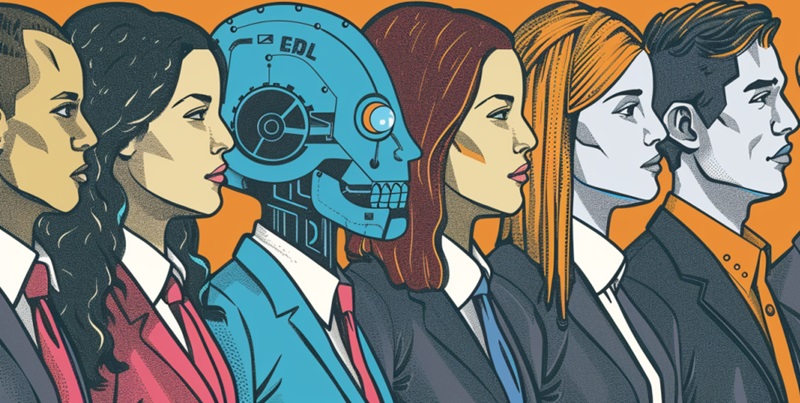As firms look to refine their talent acquisition methods, AI stands out as a transformative force. By incorporating AI, companies hope to enhance the hiring process, anticipating that technology will facilitate unbiased matching of candidates to respective roles. However, there is a pressing concern whether AI will truly reform recruitment practices or merely cloak existing biases with advanced technology. The potential of AI in automating and improving TA processes is enormous, yet the challenge remains in ensuring these systems are free from inherent prejudices that could undermine their effectiveness. As AI continues to integrate into hiring, it must be deployed cautiously to realize the full benefits while guarding against perpetuating bias. Can AI deliver on its promise to revolutionize talent acquisition? Only time will tell if it will become an unfailing tool in the search for top talent or an echo of human imperfections in decision-making.
Debating AI’s Promise for Bias Reduction
AI advocates point to the technology’s potential to offer objective and equitable candidate evaluations. Theoretically, AI systems could dispassionately overlook factors like age, gender, or ethnicity, thus eliminating human bias. Nonetheless, these systems are only as good as the data feeding them. Biased historical data means that instead of reducing bias, AI could unwittingly reinforce it, thereby transplanting age-old prejudices into new technological ground.
An additional area of AI application is in crafting and scrutinizing job descriptions. By utilizing AI, companies can identify and rectify language that might inadvertently deter capable applicants from diverse backgrounds. Still, the innate complexities of human-job fit surpass language. AI must understand the subtleties of roles and requirements, a realm where its capability remains a point of contention.
Human Touch in a Machine-driven Process
In the realm of Talent Acquisition (TA), maintaining the human touch is critical. While AI excels in efficiency, especially in preliminary screenings, advocates argue it shouldn’t overshadow the nuanced judgments and personal interactions that human recruiters excel in. These human elements are key when assessing a candidate’s fit beyond their resume qualifications, particularly regarding cultural and ideological alignment with a company.
AI tools may falter when it comes to the subtleties of human communication, underscoring the need for humans in the recruitment process. It’s the human ability to perceive the wider potential in a candidate that AI cannot yet mimic. Ultimately, while AI can streamline and expedite certain processes, it’s the collaboration between AI’s speed and human insight that ensures a holistic evaluation of candidates, keeping the essential human element at the forefront of TA.
AI and Diversity in the Workplace
The impact of AI on diversity within the workplace ignites fierce debate. Sectors like STEM, already grappling with gender imbalances, face additional challenges when AI systems, potentially trained on non-inclusive data sets, are deployed in hiring. There is anxiety that flawed algorithms may exacerbate the issue, sidelining diverse talent inadvertently.
While some argue AI could be the antidote to ingrained bias, others warn that unless AI systems are meticulously designed and continuously audited, they risk becoming the bearers of the very discrimination they were meant to dismantle. Upholding diversity, therefore, becomes a complex dance of leveraging AI’s assistance while vigilantly guarding against its potential to reduce diversity through oversimplified algorithmic selection.
Prudent Integration of AI in Hiring Practices
Incorporating AI into Talent Acquisition (TA) must be done with prudence. AI tools can enhance recruiters’ understanding of candidates’ expertise, leading to more informed hiring decisions. Such advances should be approached with care to maintain the workforce’s integrity.
However, it’s critical to balance automation with the unique aspects humans bring to recruitment, such as perceiving innovative potential, creativity, and cultural fit. While AI can efficiently narrow down candidate lists, it is the human touch that truly assesses suitability for a team. As TA evolves with AI integration, it is essential to prevent the loss of personal elements that are pivotal to the recruitment process. This balance ensures that the qualitative aspects of candidate evaluation remain at the forefront of hiring, preserving the nuanced judgment only humans can apply.
AI’s integration into Talent Acquisition (TA) calls for optimism tempered with prudence. As a beacon of efficiency, AI has potential, yet its prowess is checked by inherent limits. An ideal TA methodology marries AI’s swift, consistent screening with the unique depth that human discernment affords.
The onward march isn’t to favor AI over human touch, but to synergize the two, creating a comprehensive TA strategy. AI excels at homogenizing preliminary assessments, but it’s the human touch that discerns the standout candidate. Hence, the AI transformation in TA isn’t about displacing human recruiters but enhancing their innate strengths—ensuring that the heart of TA remains unequivocally human. This nuanced augmentation enables a higher caliber of recruitment by leveraging the best of both worlds, making way for a future where machine efficiency and human insight are inextricably interwoven in the fabric of talent acquisition.

